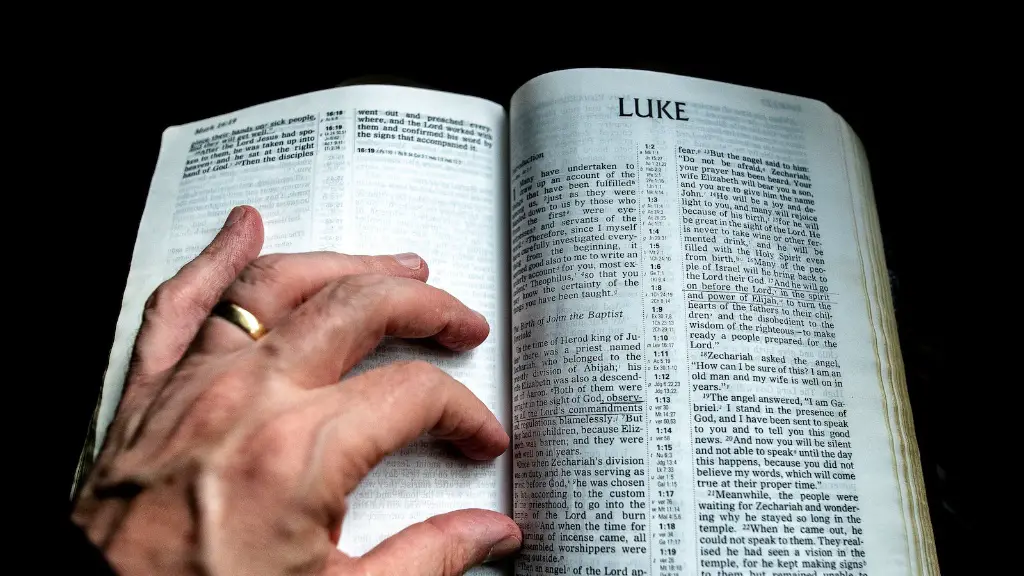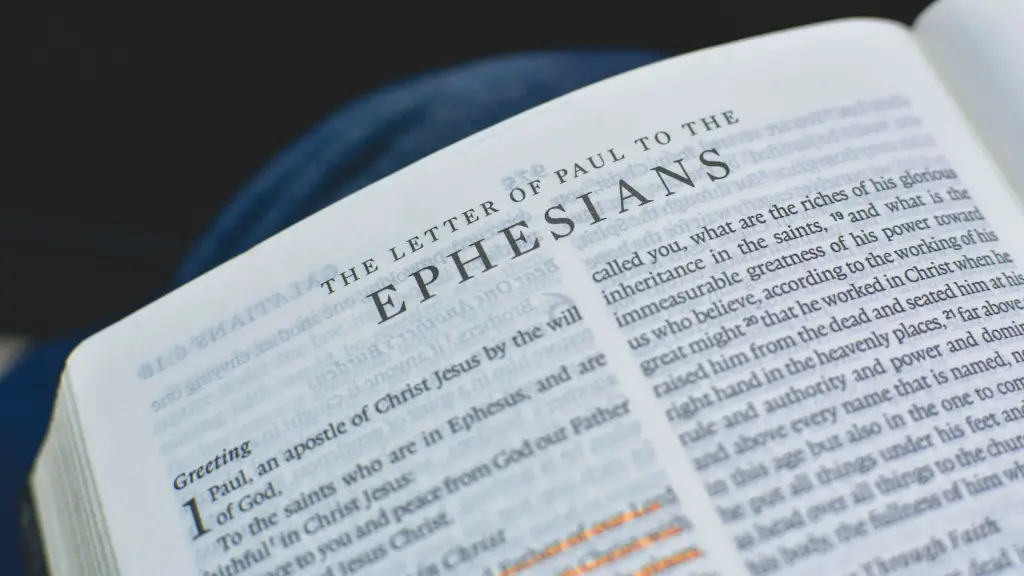Most people know about the Bible and the Christian faith which it represents. But not everyone knows the answer to the fundamental question: what is the best translation of the Bible? This is a question with many different answers depending on who you ask and the context in which it is being asked. The answer to this question will also depend on what criteria are being used to evaluate the different translations.
English translations of the Bible go all the way back to the late 1300’s though the versions used today are more modern. Many of the translations in circulation are faithful to the original texts, and have been widely accepted by theologians and Biblical scholars. Despite this, questions about the accuracy and appropriateness of some of the translations continue to be debated.
One of the main arguments used to support a particular translation is that it is more ‘literal’ or more ‘accurate’ than others. ‘Literal’ translations attempt to reproduce the original phrase and word structure and meaning of the source text, while ‘accurate’ translations are intended to more faithfully reproduce the nuance and implications of the original. The advantage of an accurate translation is that it is more likely to convey the correct meaning of the source text. However, an excessively literal translation can be difficult to understand and lead to misinterpretation.
Another factor to consider is the use of language. Some translations may make use of outdated language, or language that has been adopted from the translated language, rather than English. This can make it difficult for the modern reader to understand the text. Similarly, there are differences between the different versions in words used to describe concepts and ideas, which may lead to confusion about the actual meaning of the text.
Furthermore, some versions may use gender-specific language when referring to people or god, which can be a source of confusion. This can be particularly problematic if the text is referring to contexts in which gender is not relevant. It is therefore important to choose a translation that clearly conveys the intended meaning of the text.
Ultimately, choosing the best translation of the Bible is a matter of personal preference and interpretation. However, there are some general guidelines to help guide your choice. It is important to choose a translation that is faithful to the original source text, as well as one that is easy to understand and interpret. Additionally, it is important to consider any gender-related language that may be used in the text, and to make sure that it is accurately conveyed.
The Role of Theologians And Biblical Scholars In Translations
The work of theologians and biblical scholars has a major role to play in the interpretation of the Bible. They provide an in-depth understanding of the bible that can help to determine what is the best translation of the Bible. Theologians have access to original manuscripts, detailed knowledge of languages, and a comprehensive understanding of ancient and modern cultures which helps them to pinpoint the nuances and subtleties of the text.
These individuals are also able to provide input into the translation in order to make sure that it conveys the accurate and intended meaning of the source text. In addition to providing the literal translation, they can also provide insights into what the text means, how it should be interpreted, and the significance of its various elements.
Theologians and biblical scholars can also provide a critical analysis of the translation. This ensures that the translation is appropriate, faithful to the source material, and accurately conveys the original meaning. They can also provide feedback on how the translation might be improved upon, and suggest changes based on their research and knowledge of the text.
Finally, theologians and biblical scholars can provide guidance on which versions are the most reliable. This includes considering the texts from which the translation was made and the research conducted by biblical scholars and theologians who have evaluated the different translations.
Translating For A Modern Audience
Translations of the Bible are not just about being faithful to the original source text; they are also about understanding what a modern audience requires from a translation. The language of the Bible is somewhat archaic, and a translation needs to be able to accommodate changes in language and culture since the original texts were written. It is also important to consider how the text can be made more accessible to today’s audiences.
In order to make the texts more relevant to modern readers, translators will sometimes use dynamic translations, which aim to be more accessible to a modern audience while still attempting to faithfully reproduce the original meaning of the source text. This type of translation may use more contemporary language, and can also attempt to bridge cultural and linguistic gaps to help readers better understand the text.
It is also important to consider how a translation can be adapted for different audiences. For example, a translation for a younger audience may need to be simplified and use simpler language, while a translation for an adult audience may need to use more sophisticated and complex language. The aim is to make the translation accessible, and to ensure that it accurately conveys the intended meaning of the source text.
Finally, the choice of translation should also take into account the needs of the reader. It should be easy to understand and contain relevant information that is helpful to the reader. Ultimately, the aim is to choose a translation that will be meaningful and helpful to the reader, while at the same time conveying the intended meaning and accuracy of the original source text.
The Use Of Technology In Translations
Technology has had a major impact on the production of translations of the Bible. It has enabled translators to work quickly and efficiently, and has led to the production of high quality translations in a short space of time. Technology has also helped to ensure that the translations are faithful to the original source text, by helping to determine the literal and accurate meanings of the words and phrases.
The use of technology has also allowed for a greater degree of accuracy and consistency in the translations. It has made it easier to track changes between different versions of the source text, and to compare and contrast different translations. This has enabled more reliable translations to be produced and has helped to ensure that the translation is up-to-date and accurate.
In addition, technology has made it easier to create translations that are tailored to the needs of a particular audience. It has enabled translators to consider the context of a particular audience and tailor their translation accordingly. This has allowed translators to produce translations that can be more easily read and understood by the reader, thus enhancing the effectiveness of the translation.
Finally, the availability of online libraries and other databases has also resulted in easier access to translations. This has enabled readers to access translations of the Bible from anywhere in the world, thus making it easier for them to access a translation whenever and wherever they choose.
Conclusion
In conclusion, it is important to consider a range of factors when choosing the best translation of the Bible. It is important to choose a translation that is faithful to the original source material, as well as one that is easy to understand and interpret. Additionally, it is important to consult theologians and biblical scholars to ensure that the translation is accurate and that it conveys the intended meaning of the source text.
It is also important to consider how the translation can be adapted for different audiences in order to be more accessible and meaningful to the reader. Finally, the availability of technology has made it easier to access translations, and has enabled greater accuracy and consistency in the production of translations.






Some might enjoy a free read on this: https://archive.org/details/the-words-gone-global-exploring-bible-versions-2017-231024